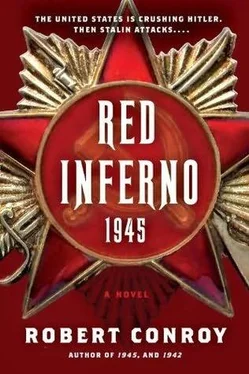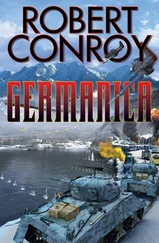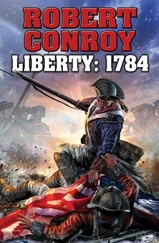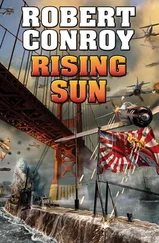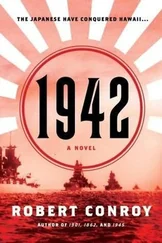Robert Conroy - Red Inferno
Здесь есть возможность читать онлайн «Robert Conroy - Red Inferno» весь текст электронной книги совершенно бесплатно (целиком полную версию без сокращений). В некоторых случаях можно слушать аудио, скачать через торрент в формате fb2 и присутствует краткое содержание. Жанр: Альтернативная история, на английском языке. Описание произведения, (предисловие) а так же отзывы посетителей доступны на портале библиотеки ЛибКат.
- Название:Red Inferno
- Автор:
- Жанр:
- Год:неизвестен
- ISBN:нет данных
- Рейтинг книги:4 / 5. Голосов: 1
-
Избранное:Добавить в избранное
- Отзывы:
-
Ваша оценка:
- 80
- 1
- 2
- 3
- 4
- 5
Red Inferno: краткое содержание, описание и аннотация
Предлагаем к чтению аннотацию, описание, краткое содержание или предисловие (зависит от того, что написал сам автор книги «Red Inferno»). Если вы не нашли необходимую информацию о книге — напишите в комментариях, мы постараемся отыскать её.
Red Inferno — читать онлайн бесплатно полную книгу (весь текст) целиком
Ниже представлен текст книги, разбитый по страницам. Система сохранения места последней прочитанной страницы, позволяет с удобством читать онлайн бесплатно книгу «Red Inferno», без необходимости каждый раз заново искать на чём Вы остановились. Поставьте закладку, и сможете в любой момент перейти на страницу, на которой закончили чтение.
Интервал:
Закладка:
The second man was Lavrentii Pavlovich Beria, the squinty-eyed and reptilian chief of state security, the dreaded NKVD. He held the rank of marshal. Beria’s army consisted of border guards and, most important, those men whose duty was to hold the regular army commanders responsible for their loyalty. Virtually at will or whim, they could shoot deserters or execute officers for failure to accomplish tasks. It hardly mattered whether the tasks were achievable. The NKVD considered failure as treason. Along with enjoying torturing people, rumor also had it that Beria was fond of small children.
Molotov and Beria waited impassively while Stalin stripped the tobacco from a couple of cigarettes, tamped the shreds into the bowl of an old pipe he habitually used, and lighted it. Each of the two men knew his place. They were Stalin’s key advisers, but not trusted ones. Stalin trusted no one. Each knew that one misstep could result in his own personal destruction. They both knew what screaming horrors were in store for those who found themselves the targets of Stalin’s wrath, and whose lives ended in the basement of the NKVD’s Lubyanka prison. Even Beria, who administered the Lubyanka, knew he was only a word away from dying there.
Stalin blew out a cloud of noxious smoke. “You’ve read this man Truman’s message. What do you think?”
Molotov knew he had to speak first. “Incredible,” he said, and Beria nodded.
“Comrade Molotov, I expected more of a response.”
Molotov found himself sweating and knew it wasn’t the heat. “It is as if it were Churchill speaking and not Truman. With Roosevelt dead, there appears to be a degree of confusion in the White House.” Again, Beria nodded.
“Comrade Molotov, do you know Truman?”
“I met him briefly, but I do not know him well at all. Few do. As you know, he came from nowhere, a political nothing.”
It was not quite a lie. Molotov had racked his brain and been unable to recall meeting Truman at any time, but concluded that it was prudent to say he must have met the former senator from Missouri who was, until very recently, the almost anonymous vice president of the United States.
Stalin relit his pipe. “Yet I am expected to believe this nonsense? That, in the name of our sacred and fraternal alliance against the Hitlerites, the Americans are going to send two full divisions into Berlin as a favor to us? I suspect the treacherous hand of Churchill in this American action. He has coerced the Americans into taking Berlin from the rear and robbing us of our glory in being the ones to take it from the Hitlerites. I suspect that the American divisions will not only try to liberate Berlin, but will also attempt to liberate Hitler and his coterie of lackeys, and use them for their own purposes. Hitler has tried for so very long to split the alliance and sue for a separate peace, and now it appears he has succeeded.”
“But why, Comrade Stalin?” Beria asked. Only his eyes betrayed any sense of nervousness.
Stalin stared at him coldly. “Because Churchill hates us almost as much as he hates the Nazis, perhaps even more. Now that Germany is defeated, he feels he can move to stop us from becoming too powerful, and he has convinced this Truman thing to go along. Do you doubt me?”
“No,” they answered in unison.
“It is utter arrogance. We will not let them rob us of our rightful vengeance. It will be stopped.”
Stalin rose and looked out the window onto the sunny but empty courtyard. “I will contact Marshals Zhukov and Koniev to discuss the final drive on Berlin. We have waited years for this moment and we will not be denied. We will be the ones to take Berlin and destroy the Hitlerite nest, not the Americans. We will not let them liberate a thing. The Americans will be stopped before Berlin, whatever the consequences and regardless of the lies they give as their intentions.”
Stalin glanced at the clock on the wall. It was midafternoon. “In a few hours, we will commence the greatest bombardment the world has ever seen. Then more then two and a half million men will assault Berlin and drive toward the Elbe. I will inform both Zhukov and Koniev that they are to expedite the pincers movement behind Berlin and seal off the rear approaches to Berlin.”
Molotov, normally impassive, paled. “But, Comrade Stalin, what if the Americans are already in Berlin or within the pincers?”
Stalin smiled tightly. “Then so be it. The Americans will squeal very loudly and learn a lesson.”
“What is the comrade tank commander staring at this fine night, this most wonderful of evenings, which signals the end of the Nazi empire?”
Commander Sergei Suslov climbed down from the dark turret of the T34 tank and stretched his tired muscles like a cat.
“Comrade driver,” he said with a tired grin to his slightly insane crewman Ivan Latsis, “I was staring at Germany across the lovely Oder River and wondering how much longer they can possibly hold out against our armies.”
They glanced across the clearly visible river where hundreds of flashes of light on the heights overlooking them showed where shells were impacting with horrible regularity. Each man had to speak clearly, as the noise level was deafening. Suslov wondered how it could be endured.
“They are not responding to our barrage,” Latsis said.
If that was the case, Suslov could not blame them. His company, his brigade, were part of the largest army the world had ever seen. It had more men, tanks, guns, and planes than could have ever been dreamed of only a few years prior, and had been accumulating and gathering its strength along the Oder for what would surely be the final assault on Berlin, only thirty miles away.
Suslov said, “They have very likely withdrawn from their fortifications, which we are so intently bombarding, and will not return to them until the advance units start to cross the Oder. Only then will they respond to our invitation to do battle.”
The Germans on the hills had an excellent view of the Russian preparations, but had chosen not to waste ammunition on them or to give away the location of their few remaining heavy guns. Suslov could not complain about that decision on their part, nor could he complain about the fact that he and his armored brigade would not be part of the first wave. Instead, they would follow once a bridgehead had been secured and would be part of the breakout.
Latsis was constantly brooding, his face looking particularly dour in the flickering lights of the distant explosions. “I hear a rumor that we won’t be allowed to attack Berlin, that the honor will fall to others.”
Suslov shrugged and tried not to see the hate on the other man’s face. “It would be an honor I could do without. Tanks are meant to fight in the open, not in streets. I had all the city fighting I could ever want at Stalingrad.”
Latsis agreed reluctantly. The name of Stalingrad was both sacred and evocative of slaughter on a mass scale. Suslov had taken another tank and crew through the battle, been wounded, and returned to duty as this tank’s new commander a few months earlier.
“Even so,” Latsis insisted, “I would like the opportunity to destroy a portion of the city and the people inside it.”
“I know,” Suslov said gently.
Latsis had told them several times what had happened to his village when the Nazis took it. It was not just that the people had been killed, but how they had died. Slaughtered was the better word, although even that was inadequate to describe the rape and torture that had preceded death in so many cases. Latsis was obsessed with the fact that both his mother and his sister had been gang-raped and mutilated by a bunch of Nazis, and left to die. He had found through the handful of survivors that his thirteen-year-old sister had lived in screaming agony for a few days after, but that his mother had died almost immediately.
Читать дальшеИнтервал:
Закладка:
Похожие книги на «Red Inferno»
Представляем Вашему вниманию похожие книги на «Red Inferno» списком для выбора. Мы отобрали схожую по названию и смыслу литературу в надежде предоставить читателям больше вариантов отыскать новые, интересные, ещё непрочитанные произведения.
Обсуждение, отзывы о книге «Red Inferno» и просто собственные мнения читателей. Оставьте ваши комментарии, напишите, что Вы думаете о произведении, его смысле или главных героях. Укажите что конкретно понравилось, а что нет, и почему Вы так считаете.
